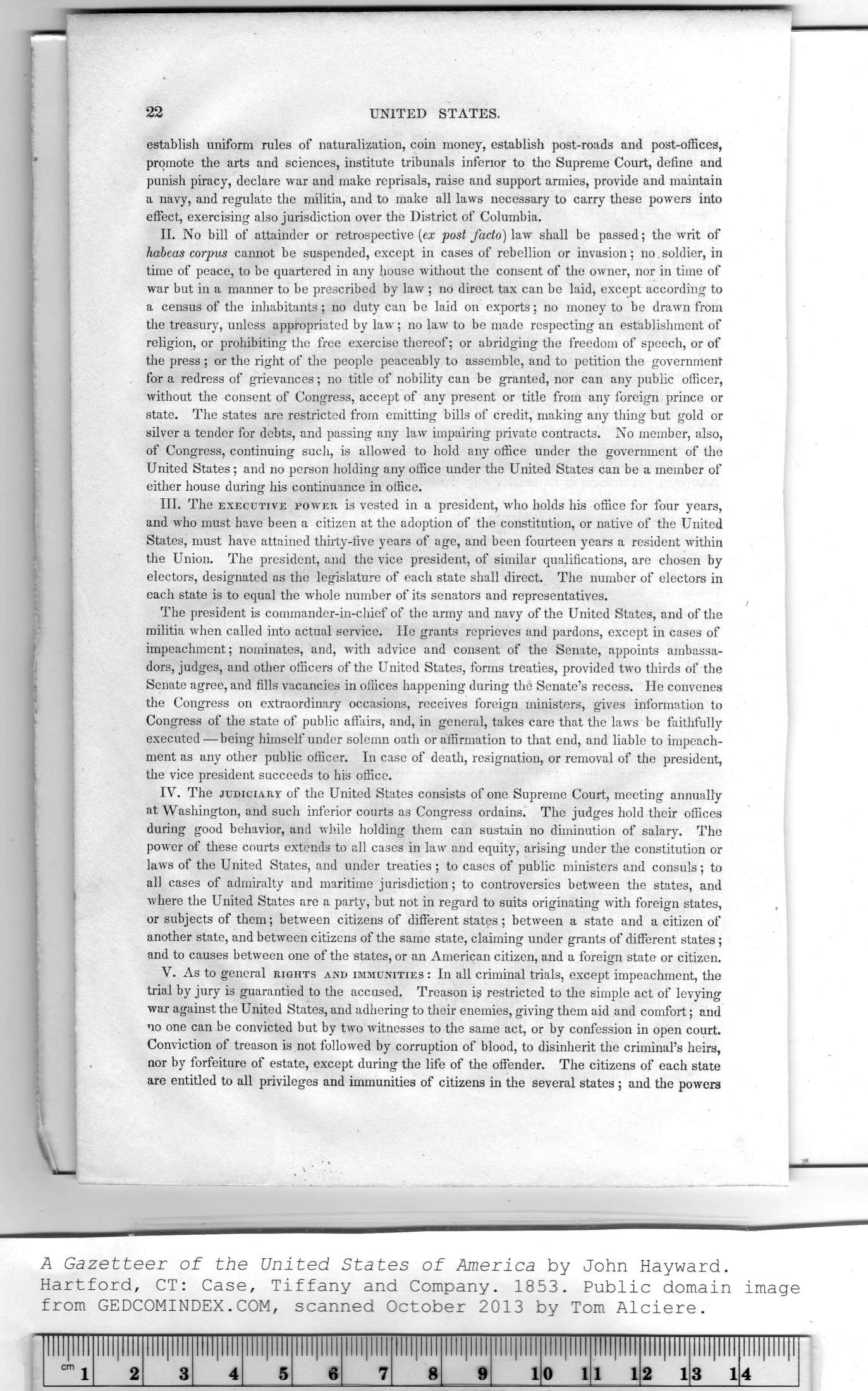|
|
Note: Ctrl and + increases the font size of the text below, Ctrl and - decreases it, and Ctrl and 0 resets it to default size.
22 UNITED STATES.
establish uniform rules of naturalization, coin money, establish post-roads and post-offices,
promote the arts and sciences, institute tribunals inferior to the Supreme Court, define and
punish piracy, declare war and make reprisals, raise and support armies, provide and maintain
a navy, and regulate the militia, and to make all laws necessary to carry these powers into
effect, exercising also jurisdiction over the District of Columbia.
II. No bill of attainder or retrospective (ex post facto) law shall be passed; the writ of
habeas corpus cannot be suspended, except in cases of rebellion or invasion; no. soldier, in
time of peace, to be quartered in any house without the consent of the owner, nor in time of
war but in a manner to be prescribed by law ; no direct tax can be laid, except according to
a census of the inhabitants ; no duty can be laid on exports; no money to be drawn from
the treasury, unless appropriated by law; no law to be made respecting an establishment of
religion, or prohibiting the free exercise thereof; or abridging the freedom of speech, or of
the press ; or the right of the people peaceably to assemble, and to petition the government
for a redress of grievances; no title of nobility can be granted, nor can any public officer,
without the consent of Congress, accept of any present or title from any foreign prince or
state. The states are restricted from emitting bills of credit, making any thing but gold or
silver a tender for debts, and passing any law impairing private contracts. No member, also,
of Congress, continuing such, is allowed to hold any office under the government of the
United States; and no person holding any office under the United States can be a member of
either house during his continuance in office.
III. The executive power is vested in a president, who holds his office for four years,
and who must have been a citizen at the adoption of the constitution, or native of the United
States, must have attained thirty-five years of age, and been fourteen years a resident within
the Union. The president, and the vice president, of similar qualifications, are chosen by
electors, designated as the legislature of each state shall direct. The number of electors in
each state is to equal the whole number of its senators and representatives.
The president is commander-in-chief of the army and navy of the United States, and of the
militia when called into actual service. He grants reprieves and pardons, except in cases of
impeachment; nominates, and, with advice and consent of the Senate, appoints ambassa-
dors, judges, and other officers of the United States, forms treaties, provided two thirds of the
Senate agree, and fills vacancies in offices happening during the Senate's recess. He convenes
the Congress on extraordinary occasions, receives foreign ministers, gives information to
Congress of the state of public affairs, and, in general, takes care that the laws be faithfully
executed —being himself under solemn oath or affirmation to that end, and liable to impeach-
ment as any other public officer. In case of death, resignation, or removal of the president,
the vice president succeeds to his office.
IV. The judiciary of the United States consists of one Supreme Court, meeting annually
at Washington, and such inferior courts as Congress ordains. The judges hold their offices
during good behavior, and while holding them can sustain no diminution of salary. The
power of these courts extends to all cases in law and equity, arising under the constitution or
laws of the United States, and under treaties ; to cases of public ministers and consuls; to
all cases of admiralty and maritime jurisdiction; to controversies between the states, and
where the United States are a party, but not in regard to suits originating with foreign states,
or subjects of them; between citizens of different states ; between a state and a citizen of
another state, and between citizens of the same state, claiming under grants of different states;
and to causes between one of the states, or an American citizen, and a foreign state or citizen.
V. As to general rights and immunities: In all criminal trials, except impeachment, the
trial by jury is guarantied to the accused. Treason is restricted to the simple act of levying
war against the United States, and adhering to their enemies, giving them aid and comfort; and
no one can be convicted but by two witnesses to the same act, or by confession in open court.
Conviction of treason is not followed by corruption of blood, to disinherit the criminal's heirs,
nor by forfeiture of estate, except during the life of the offender. The citizens of each state
are entitled to all privileges and immunities of citizens in the several states ; and the powers
|
Illllllll |
llll llll |
Illllllll |
llll llll |
Illllllll |
llll|llll |
Illllllll |
Illllllll |
Illllllll |
Illllllll |
Illllllll |
|
4 |
5 |
6 |
7 |
8 |
9 |
1 |
0 1 |
1 1 |
2 1 |
3 1 |
|
